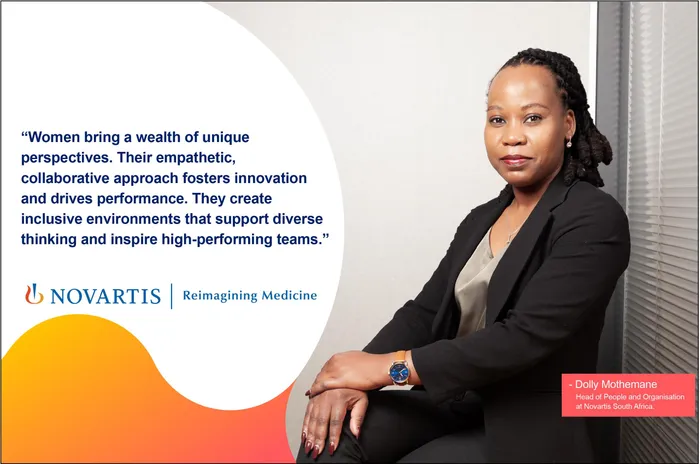The returns of representation: how women in pharma leadership are delivering measurable impact

Head of People and Organisation at Novartis South Africa, Dolly Mothemane, Image: Supplied
Long before the modern pharmaceutical industry became what it is today, women were already shaping the way we care for one another. In various cultures across the world, women have always been the first responders to illness and injury. Across traditions and cultures, women have been the healers, the first responders, the midwives, and the guardians of collective well-being. Though their vital role is woven into the very DNA of health, women today remain markedly underrepresented in leadership—especially in South Africa, where the legacy of exclusion continues to shape career trajectories.
According to the World Economic Forum’s 2024 Global Gender Gap Report, women make up only 28.2% of the global STEM workforce. The journey to the top is strictly gatekept: only about 12% of leadership roles in STEM companies globally are held by women.
Novartis South Africa is not only acknowledging women’s historical role as leaders and healers but is actively working to inspire more women to take up space in vital and lucrative industries like the pharmaceutical sector.
A journey of purpose and impact
At the forefront of this transformation is Dolly Mothemane, Head of People and Organisation (P&O), whose journey from talent acquisition to the C-suite is as inspiring as it is instructive to young girls dreaming of working in medicine as well as across STEM fields.
“It has always been a dream of mine to become a leader in one of the pharmaceutical industries,” says Mothemane. “I always positioned myself as a trusted business partner, not just an HR Generalist, and that mindset helped shape my path,” she adds.
Her leadership style is rooted in curiosity and empathy, having exposed herself to different industries and experiences very early on in her career. Adding to this sentiment, Dolly says: “It means you’re curious. That curiosity shaped me into a leader who values openness and diversity and is essential for building inclusive workplaces.”
The measurable value of women’s leadership
While the moral imperative for gender equity is clear, the business case is just as compelling. Globally, companies with more diversity in STEM leadership roles report up to 19% higher innovation-generated revenue. In an industry built on discovery and progress, that’s not just a statistic; it’s invaluable learning with a proven impact on the bottom line.
“Women bring a wealth of unique perspectives,” says Mothemane. “Their empathetic, collaborative approach fosters innovation and drives performance. They create inclusive environments that support diverse thinking and inspire high-performing teams.”
At Novartis SA, the impact of increased female representation is already visible. “It’s changed the culture,” she says. “It shows our associates that career progression is attainable for everyone, regardless of gender, and it’s helping us address local healthcare challenges more effectively.”

Image: Supplied
Beyond compliance: Transformation as a personal mission
In South Africa, transformation is often framed in terms of compliance—Broad-Based Black Economic Empowerment (BBBEE), Employment Equity (EE), and scorecards. But for Mothemane, transformation is far more personal and profound. “It’s about dismantling historical, structural, and systemic barriers that have kept women and underrepresented communities on the margins,” she explains.
At Novartis SA, this vision is being realised through a suite of progressive policies and cultural shifts. The company’s EPIC Pledge, launched in 2018, committed to achieving gender balance in management and ensuring pay equity transparency by 2023.
“We’ve also embraced flexible work arrangements. These measures make a meaningful difference, especially for women who balance professional and family roles,” adds Mothemane.
Through leading the charge in this transformation journey in medicine by promoting leaders based on merit and fostering psychological safety, the company is creating an environment where women can rise.
Lighting the path for future leaders
The impact of increased female representation is already visible. “It’s changed the culture,” she says. “It shows our associates that career progression is attainable for everyone, regardless of gender. And it’s helping us address local healthcare challenges more effectively, like improving access to essential medicines and partnering with community health organisations.”
“Mentorship provides guidance and advocacy. Networking opens doors. These platforms help women build leadership, decision-making, and technical skills,” she says.
Her advice to young African women aspiring to leadership in the pharmaceutical industry or STEM fields is both practical and powerful: “Yes, it will be challenging. But with the right mindset, strategies, and support systems, you can carve out a successful path. Find mentors. Believe in yourself. Conquer impostor syndrome. Your voice is needed.”

Image: Supplied
Looking ahead, Mothemane envisions a pharmaceutical sector where gender equity is not aspirational. It’s operational. “We need industry-wide DEI commitments, mentorship programs, and inclusive cultures. And we need to start now,” she concludes.
Long before the concept of gender equity was widely acknowledged in boardrooms, women were at the forefront of healthcare. Now, as leaders like Dolly Mothemane pave a new path in the pharmaceutical sector, they are not merely supporting women’s roles—they are revolutionising healthcare through inclusivity and solidarity. This is not just about making room at the table; it's about rebuilding the entire table for generations to come.